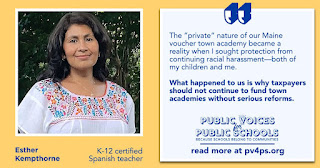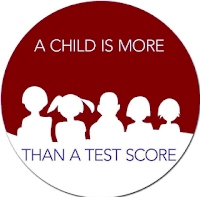Be sure to enter your email address in the Follow Us By Email box in the right-hand column to be informed when our blog posts are published.
NOTE: The next posting of NEIFPE's In Case You Missed It will be on Jan 9, 2023. Happy Holidays.
THIS WEEK
Today's articles feature charters, vouchers, and superintendent salaries.
NEEDED: CHARTER REGULATIONS
U.S. Senate Rejects GOP Effort to Overturn Biden Administration Charter Regulations
Private schools that receive public tax dollars should be subject to public oversight.
From Diane Ravitch
Senator Tim Scott of South Carolina offered a resolution to overturn the Biden administration’s new regulations on federal funding of charter schools. The vote was 49-49, strictly on party lines. Even charter school supporters like Senator Cory Booker of New Jersey and Senator Michael Bennett of Colorado voted to sustain the new rules.
Every Republican voted to reject the rules. The charter lobby was not at all pleased.
The Network for Public Education has worked very hard to persuade the Department of Education and Congress to regulate the federal Charter Schools Program. When Betsy DeVos was Secretary of Education, there was no chance that the Department would try to regulate the $440 million handed out to new charter schools every year. The federal government was the single biggest contributor to new charter schools.
NPE published reports about the large number of charter schools that closed or never opened. It wrote about for-profit charters that were enjoying federal largesse. It drew attention to charter school scandals, including white flight academies subsidized by federal funds.
Not until the Biden administration took office did anyone in the Department take seriously its responsibility to oversee federal funding of charters.
What do the new regulations require? What did every single Republican Senator try to block? We’re [sic] they upset about the limits on for-profit operators? Or did they object to transparency and accountability for federally funded charters?
NPE executive director Carol Burris explained in this article published at Valerie Strauss’s Answer Sheet blog...
VOUCHER DISRUPTION
Josh Cowen: What about the Kids Who Give Up Their Vouchers?
Vouchers cause disruption to students' lives when they transfer in and out. The reasons students leave voucher schools are varied. Sometimes the school decides that the student isn't "the right kind of student." Sometimes the student and their family decide that school isn't right for them. Sometimes the cost of the school so exceeds the voucher that the student can't afford to attend. Whatever the cause, student mobility has an impact on student learning.
From Diane Ravitch
Betsy DeVos likes to say that schools shouldn’t be “one size fits all.” She’s conceding more than she knows with that analogy because unlike clothing, or a car you can test drive down at the Ford dealer, there’s a real cost to trying a school on and having it fail to fit.
Study after study has shown how harmful school mobility is for kids, both those who actually move between schools and those whose classrooms are full of peers coming in and out.
As Russell Rumberger, an expert in this area has succinctly summarized:
“The research literature suggests that changing schools can harm normal child and adolescent development by disrupting relationships with peers and teachers as well as altering a student’s educational program.”
THE BOTTOM LINE...MONEY
Maine “Town Academy” Voucher School Refused to Address Racial Intimidation
Private schools which accept public funds should be subject to public oversight.
From Public Voices for Public Schools
The “Big 10” Maine Town Academies have been in operation for over 225 years. They are known as “60/40” schools because at least 60% of their funding is public money. Many are almost 100% publicly funded, and these voucher schools are “private schools” when it is convenient and “public” when they want public money.
The ”private” nature of our town academy became a reality when I sought protection from continuing racial harassment—both of my children and me. What follows is what happened to us and why taxpayers should not continue to fund town academies without serious reforms.
FWCS SUPERINTENDENT GETS A RAISE
Fort Wayne Community Schools superintendent gets $10,000 raise
From the Fort Wayne Journal Gazette**
Superintendent Mark Daniel’s salary will increase by $10,000 under his first raise since returning to Fort Wayne Community Schools more than two years ago.
The 4.6% pay bump brings Daniel’s annual salary to $225,000.
Anne Duff, school board president, announced the board’s decision to increase the superintendent’s compensation Monday. Approval wasn’t required during the meeting, Duff said, but the elected leaders wanted to mention the raise for transparency’s sake.
“I think we all agree that he’s done a great job for us,” Duff said.
Daniel – a 1979 North Side High School graduate who also started his education career there – was one of three finalists for FWCS’ top job. He succeeded Wendy Robinson, who retired from the position in 2020 after leading the district for 17 years.
The terms of Daniel’s contract state the board can increase his base salary by 1% to 10% if he is evaluated as highly effective or effective and achieves annual performance objectives established by the board.
Under Daniel’s leadership, Amp Lab at Electric Works became a reality and FWCS partnered with Junior Achievement of Northern Indiana to implement the 3DE concept at the high school level, Duff said. She noted Daniel also worked with Tom Kelley in forming the Jim Kelley Career Pathway Center.
EACS TO TRANSFER PROPERTY TO CHARTER SCHOOL
East Allen County Schools eyes southeast Fort Wayne property transfer
It's disappointing that a public school system is doing anything to support privatization. Here we have East Allen County Schools transferring property to a charter school.
From the Fort Wayne Journal Gazette**
East Allen County Schools doesn’t intend to make money off property it recently learned it still owns.
Instead, it is planning a straight transfer of the two southeast Fort Wayne parcels to a charter school that has property nearby, said Chief Financial Officer Pat McCann, who presented information about the situation during a public hearing and subsequent board meeting Tuesday.
The midday public hearing at the East Allen Career Center in New Haven generated no input.
The parcels along Christofer Lane and Werling Drive were apparently overlooked when, in 2006, EACS gave the former Village Woods Middle School building to an organization that wanted to open a community center in the space.
Smith Academy for Excellence purchased the property, 2700 E. Maple Grove Ave., in 2019 for $69,000. The charter school’s construction plans affect the nearby EACS-owned parcels, McCann said.
“East Allen County Schools does not have any need for the two parcels,” he said, “and Smith Academy is requesting that the parcels be transferred.”
**Note: The Fort Wayne Journal Gazette is behind a paywall. Digital access, home delivery, or both are available with a subscription. Staying informed is important, and one way to do that is to support your local newspaper. For subscription information, go to fortwayne.com/subscriptions/ [NOTE: NEIFPE has no financial ties to the Fort Wayne Journal Gazette]
†Note: NEIFPE's In Case You Missed It is posted by the end of the day every Monday except after holiday weekends or as otherwise noted.
###





















